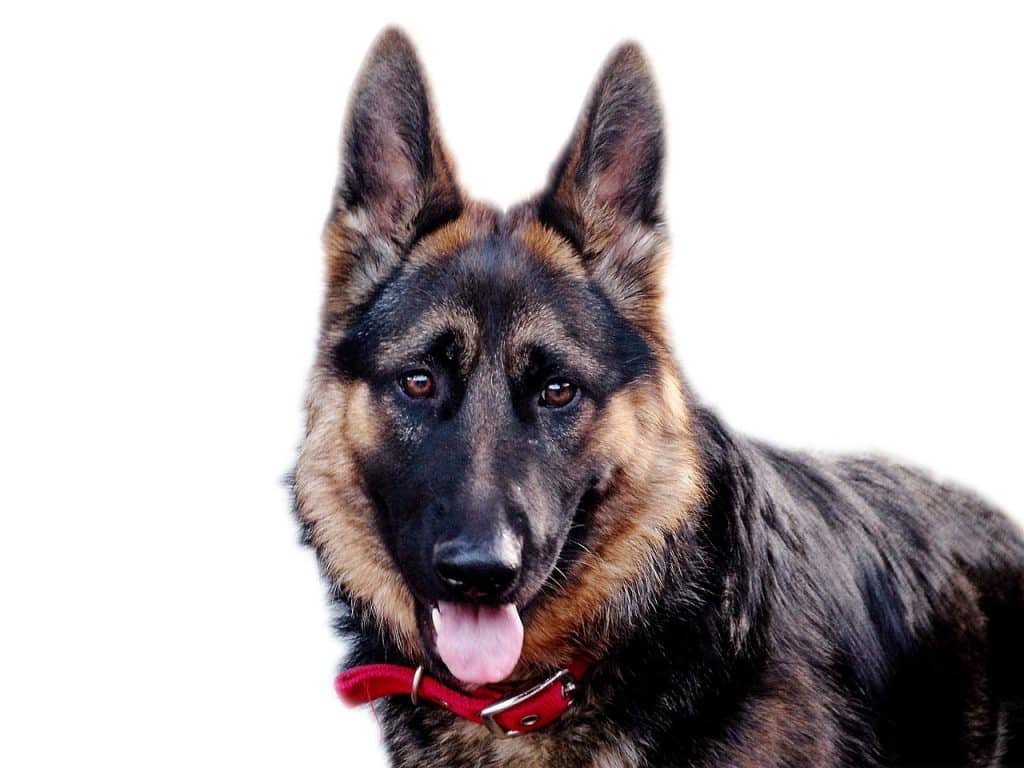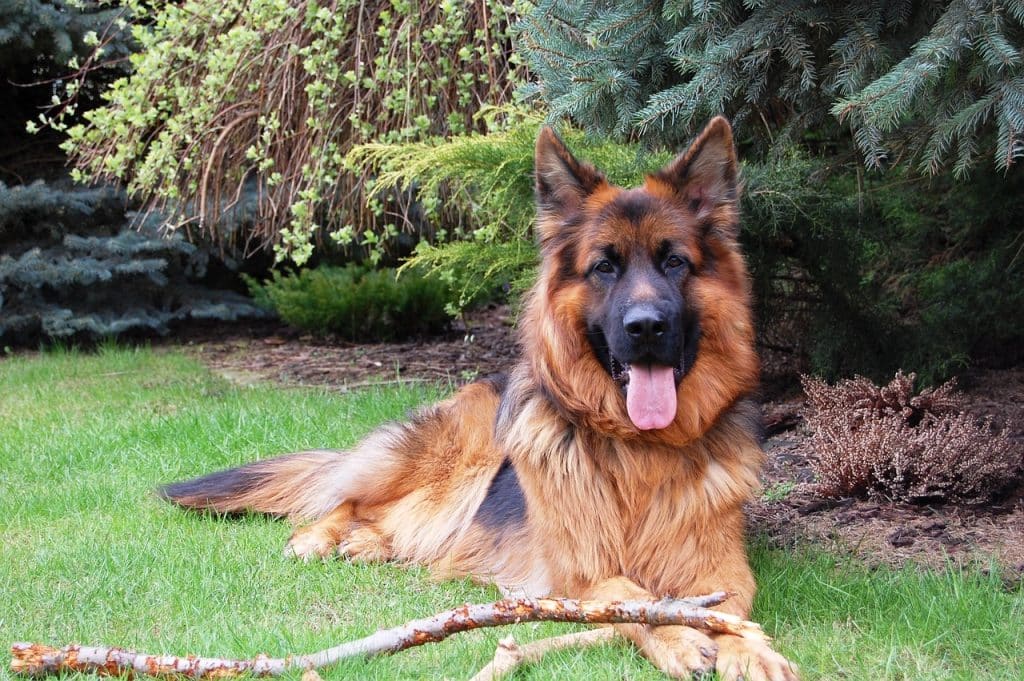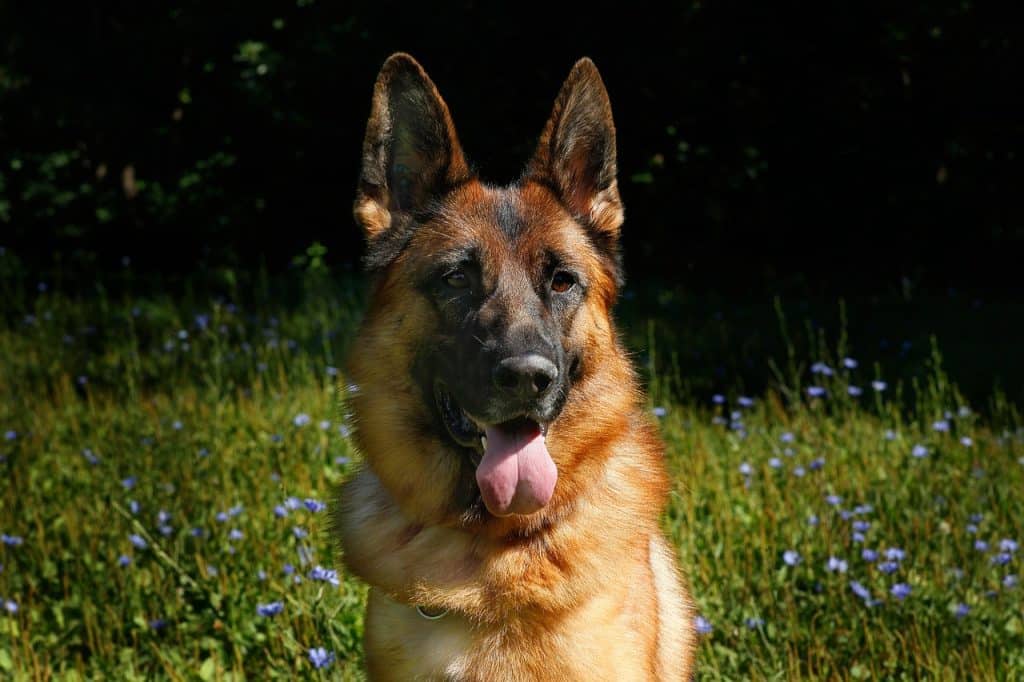
| Height: | 15 – 20 inches |
| Weight: | 30 – 50 pounds |
| Lifespan: | 9 – 16 years |
| Colors: | Black, brown, tan |
| Suitable for: | Families, couples, singles |
| Temperament: | Intelligent, agile, noble, proud, alert, energetic, athletic |
The Miniature German Shepherd is more than just a miniature version of a Standard German Shepherd: They are actually a hybrid breed, typically a mix of a standard German Shepherd and a smaller breed, usually a Border Collie or Poodle. The result is a designer dog that has the personality, intelligence, and appearance of a German Shepherd but that can live in smaller homes and even apartments and is far easier to look after and handle.
There is a certain amount of controversy surrounding the breed, as the name is somewhat of a misnomer. Many backyard breeders attempt to sell the breed as a truly miniature version of a standard German Shepherd, but the truth is that the dog is a mixed breed. This means that the Mini German Shepherd may share many similar traits with a German Shepherd but may inherit other traits from their parent breeds too. If you are looking for a carbon copy of the German Shepherd in a smaller package, these, unfortunately, do not exist.
That being said, the Miniature German Shepherd is a wonderful hybrid breed nonetheless, and if this dog sounds like it may be the one for you, read on for an in-depth look at this unique breed.
Miniature German Shepherd Puppies — Before You Bring One Home…
Miniature German Shepherds can vary fairly widely in appearance and size, depending on what breed the German Shepherd was bred with. While they do often resemble a smaller German Shepherd, remember that due to their mixed genetics, they will not have the same temperament and characteristics as a standard German Shepherd.
Many people are tricked into thinking that these dogs are true pint-sized German Shepherds, so you’ll need to visit the breeder and view the parents to make sure of the genetics and ensure that they are healthy and happy and that the parents have all the relevant paperwork.
3 Little-Known Facts About Miniature German Shepherds
1. They go by several different names
While these dogs are commonly known as Miniature German Shepherds, this name can be somewhat confusing, so the breed is often referred to by other names, including the Shollie, Shepadoodle, and Siberian Shepherd.
2. They have a longer lifespan than German Shepherds
German Shepherds have a comparably long lifespan for such a large breed and can easily live for up to 15 years. Miniature German Shepherds, largely due to their mixed genetics, typically have a longer lifespan and often live up to 16 years or more, depending on their parent breeds.
3. German Shepherd Dwarfism and Miniature German Shepherds are different
There is a rare inherited genetic disorder that can sometimes occur when breeding two purebred German Shepherds called German Shepherd Dwarfism. While this does result in smaller German Shepherds, they are not the same as Miniature German Shepherds, and people often get the two confused. These dwarf Shepherds are the same as a standard German Shepherd in every way, except they have much shorter legs. These dogs are prone
Temperament & Intelligence of the Miniature German Shepherd

Miniature German Shepherds are intelligent animals, no matter their parent breed. They are typically hybrids of a German Shepherd and a Border Collie or Poodle, so the resulting crossbreed is usually just as smart as their parents. The same goes for energy and exercise needs; with those parents, these dogs are high-energy! These dogs need more exercise than even a purebred German Shepherd, and as any Miniature German Shepherd owner will tell you, it takes a great deal to tire these pooches out.
They are loyal dogs and inherit the German Shepherd’s unwavering dedication and devotion. This makes them excellent guard dogs, and they will do anything to protect their owners, just like a standard German Shepherd. One plus of having this smaller version of the German Shepherd is that they are highly adaptable and can live in small homes and apartments happily, provided that they get sufficient exercise.
Are These Dogs Good for Families?
With their calm temperament and unwavering loyalty, Miniature German Shepherds make ideal family pets. They have a strong instinct to protect their owners, so they make excellent guard dogs. Like their parent breeds, they thrive off of human companionship and adore being around their owners. This can be a problem if you are out frequently, as they are prone to suffering from separation anxiety. If you are away from home for large chunks of time, this is probably not the breed for you.
Does This Breed Get Along With Other Pets?
German Shepherds have a strong prey drive, and Miniature German Shepherds are much the same. This means that early socialization is essential for this breed — the earlier, the better — to prevent them from going after the family cat!

Things to Know When Owning a Miniature German Shepherd
Food & Diet Requirements ?
The Miniature German Shepherd does not have any special dietary requirements and should be fed as you would normally feed a medium-sized dog. Around 2 or 3 cups of high-quality kibble are ideal and should be split into two meals a day to prevent bloating. Be sure to check that the first listed ingredient on the food is an animal-sourced protein and that the food is free from too many filler ingredients, such as wheat, corn, and soy. While these dogs are not prone to getting overweight, too many of these ingredients can cause weight gain and digestive issues too.
It’s a great idea to supplement their dry kibble with lean meats and organ meats a few times a week. This will add welcome variety and give them a boost of high-quality protein and amino acids.
Exercise
Miniature German Shepherds are highly energetic pooches that will need a great deal of daily exercise to stay healthy and happy. We recommend at least 1 hour or 2 a day, but the more, the better. It’s a good idea to devote an hour to a slow walk with off-leash time and then another hour for more intensive exercise. This could be a run, jog, bike ride, or an intensive interactive game, like fetch or frisbee.
These intelligent pooches will love agility exercises and games, and this will give them plenty of mental and physical stimulation. Remember that these dogs have lineages that were bred for a specific purpose, and the closer you can get to giving them directed exercises, the better. They are highly intelligent, so mental and physical stimulation is essential to prevent boredom and undesirable behavior.

Training
Training a Miniature German Shepherd is usually a breeze, as they are intelligent dogs with parent breeds that have a long history of working closely with humans. Just like other working breeds, these dogs respond well to positive reinforcement training methods. This method requires consistency and dedication, but the result is well worth it. Try to begin training your dog from the day that you bring them home, as this will help set the training and prevent them from picking up any bad habits, which are harder to fix.
The key to training these dogs well is consistency and repetition, but try to make training a fun experience and avoid too many of the same exercises. These dogs are prone to “switching off” if they are doing the same exercises over and over again, so try and keep the sessions short but fun. German Shepherds can be stubborn and aloof at times, and the same trait may be passed down to your dog. Early socialization with people and other dogs is crucial for avoiding this and will make training them easier.
Grooming
Miniature German Shepherds are fairly high-shedding pooches and need to be brushed every couple of days to remove any excess dead hair. Their coats are usually short like a German Shepherd’s, but they may be slightly longer or thicker, depending on the parent breeds, in which case, they’ll need more regular brushing. They’ll only need a bath when they get exceedingly dirty, and even then, a good rinse with warm water is usually sufficient. Bathing them with human shampoos or too often can strip their coat of their natural oils and cause further shedding and even allergies down the line.
Other than that, they’ll need occasional teeth brushing to avoid dental decay and plaque build-up, and they may need nail trimming every month or two.

Health and Conditions
The Miniature German Shepherd is a healthy breed that benefits from hybrid vigor, the resulting good health from mixing pure-bred dogs. However, there are no guarantees, and there are a few issues that may be passed down from their parent breeds, including hip and elbow dysplasia, hemophilia, and epilepsy.
Gastric dilatation-volvulus is fairly common in dogs with deep chests, so be sure to feed your dog two to three small meals throughout the day and avoid feeding them after exercise. Degenerative myelopathy is fairly common in senior German Shepherds and may be seen in German Shepherd hybrids too.
Minor Conditions
- Obesity
- Allergies
- Epilepsy
Serious Conditions
- Hip and elbow dysplasia
- Degenerative myelopathy
- Gastric dilatation-volvulus
- Hemophilia
Male vs. Female
While these dogs can vary in size due to their mixed genetics, males are typically larger than females, although not usually by much. Males are usually slower to mature and may be more of a challenge to train than females, although females are prone to be moodier and slightly more aloof at times, which can also present a challenge in training. Females are less needy and attention-demanding, while males typically will take all the affection that they can get!
Remember that these traits are largely anecdotal, and your dog’s personality can vary widely, depending on their training and the environment in which they are raised. These factors will affect their character far more than their sex.
Final Thoughts
The Miniature German Shepherd is a great family dog, with a gentle, affectionate, and loyal personality. They are highly intelligent and easy to train and have a long lifespan, with few hereditary diseases to be concerned about. Miniature German Shepherds are highly adaptable pooches and can live happily in small houses and apartments, provided that they get the necessary exercise. They are high-energy dogs that have a ton of stamina, so they will need a great deal of daily exercise to stay healthy and happy.
While Miniature German Shepherds are mixed breeds and not truly pint-sized German Shepherds, they are still wonderful dogs and will make a great addition to any family home.
Which Shepherd breed is the tiniest?
Although I assumed it was the Cardigan or Pembrokeshire Welsh Corgi, it turns out to be the Miniature American Shepherd, which is 14 to 18 inches tall and is a few inches shorter than both Corgis and the small Icelandic Sheepdog.
What is the most uncommon Shepherd breed?
Because liver German Shepherds are extremely rare, you’re unlikely to discover one in a shelter or rescue facility. The majority of liver GSDs are created by “designer or specialist breeding programs,” although they do emerge “randomly in litters of ordinary breeding programs” on occasion.
What is the rare dog?
Lundehund (Norwegian) The Norwegian Lundehund, which dates back to the Ice Age, is considered one of the world’s rarest dog breeds owing to its distinct traits that no other species has.
What is the most despised dog?
Cesky Terrier is one of the ten least popular breeds. The Foxhound of America. Sheepdog from Bergamasco. The Foxhound of England. Harrier. Chinook. Lundehund is a Norwegian breed. Sloughi. More to come.
Who is the wisest Shepherd?
The border collie is often regarded as the brightest dog and the canine world’s overachiever. Border collies were originally developed as herding dogs, but they can handle almost any job you give them.
What is the smartest dog?
The border collie is a breed of dog. The border collie is the brightest canine breed known to man, according to The Intellect of Dogs, which rates 131 dog breeds in terms of their relative intelligence. … Poodle…. German shepherd…. Golden retriever…. Doberman pinscher…. Shetland sheepdog…. Labrador retriever.
What kind of dog is the most devoted?
The Most Loyal Dog Breeds That Will Always Be By Your Side are Labrador Retrievers, Bulldogs, Golden Retrievers, German Shepherds, Beagles, Pugs, Irish Setters, and Brussels Griffons.
Which kind of dog has the lowest IQ?
The Pug is a delightful tiny dog bred to be an endearing companion. It is typically affable, sweet, and humorous. Weimaraner, Irish Setter, and Basset Hound are some of the breeds available
What makes dogs lick you?
Dogs lick as a natural and instinctual behavior. It’s a method for them to groom, bond, and express themselves. Your dog may lick you to express their affection for you, to seek your attention, to relieve tension, to demonstrate empathy, or just because you taste nice to them!
What dog has the appearance of a German Shepherd but is smaller?
A Belgian Malinois resembles a smaller, blonder German shepherd and is occasionally misidentified as one. Malinois are fawn-colored shorthaired dogs with a black overlay, mask, and ears.